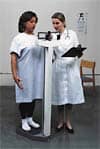In honor of May being Better Sleep Month, Sleep Apnea Treatment Centers of America (SATCOA) offers five tips for better sleep.
1. You are what you eat. There’s an old saying that you should eat breakfast like a king, lunch like a prince, and dine like a pauper. If we follow these words of wisdom, we will not only have energy to give our day a jolt of unbridled energy but we will also be able to sleep like a baby. Eating a heavy and large meal toward the end of the day will put our stomach and intestines to work, which makes sleep more difficult. It is smart to avoid fatty foods that stress our digestive system, and acidic or spicy foods late in the day can instigate heartburn and upset stomach. For some individuals who might need a bedtime snack, it is advisable to partake in dairy foods and complex carbs but consume them no more than an hour before going to bed. Some suggestions would be: bowl of cereal with milk, granola with yogurt, banana, half of a turkey sandwich, and crackers and cheese.
2. Cut down on the full-test java and black tea late in the day. Many people know the benefit of a good cup of Joe first thing in the morning, which can give us the kick in the pants to get our day started. But as the hours of the day move toward evening, it is advisable to avoid caffeine-infused beverages. Why? Caffeine remains in our system anywhere from 3 to 5 hours after consumption and causes the deep stages of sleep to be disrupted. And thus even a mere Hershey’s kiss or decaffeinated coffee may affect nighttime rest. In addition, be aware that there are some medications and weight loss products that contain caffeine.
3. Exercise can improve your overall body and mind. Studies have demonstrated that consistent exercise can improve the quality of sleep. People who walk, run, bike, or perform any other form of physical activity tend to fall asleep faster and reap the benefits of deeper sleep. Of note, it is important to not exercise intensely 3 to 4 hours before putting our head down on the pillow. However, before bedtime, yoga and tai chi are perfectly fine as they assist in winding down and relaxing the mind.
4. Pets can be like family but keep them off the bed. According to a Mayo Clinic Sleep Disorders Center survey, more than half of people who own pets shared that their quality of sleep is negatively impacted. No matter if our furry and four-legged family member is a dog or a cat, pets can move around at night and prevent us from achieving a good night of sleep. Add to the mix that their bodies can be a haven for fleas, ticks, dander, and pollen, sparking sleep-disruptive sneezing and nasal congestion.
5. Develop a pre-sleep ritual. Our mind and body are active all day. It is no surprise that it can be quite a challenge to turn off or wind down and free our mind as we prepare to close out the day with much-needed rest. Creating a pre-sleep ritual that can be performed every evening about an hour before hitting the hay can help. The following are some suggestions that can get a person started:
Current worries? Put them into list form and develop a plan to deal with them the next day.
- Take a warm bath or shower, and even better use sleep-inducing soap scents like lavender and chamomile.
- Read a book with a small reading light, or listen to an audio version.
- Listen to calming, meditative music.




